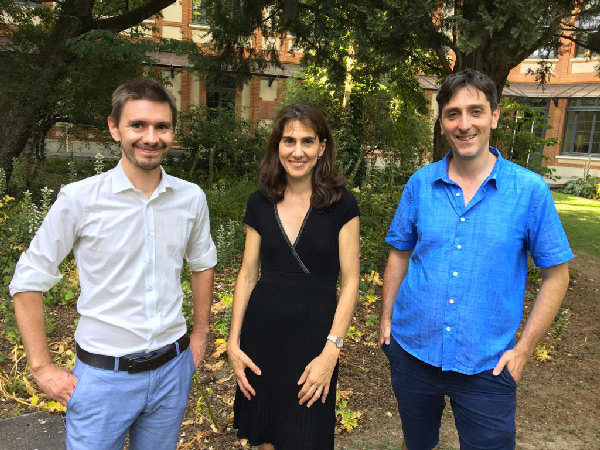Objectives of the chair
The Law, Accountability and Social Trust in AI Chair brings together an interdisciplinary team of researchers in law, computer science and mathematics. It also includes professionals working in critical AI application sectors, in particular in the health and public safety sectors. The Chair favors a pragmatic approach through industrial and institutional partnerships, such as Toulouse Metropole, Occitanie Data, the Oncopole, and the National Police Force.
À la croisée du droit et de la technique, l’objectif principal est d’étudier les risques sociaux susceptibles d’être générés par l’IA. Il s’agit d’envisager les réponses apportées par le droit pour atténuer les risques et réparer les dommages qui pourraient survenir. Pour ce faire, la chaire analyse et anticipe les effets des règles de droit en intégrant les caractéristiques techniques de l’IA, ce qui est rendu possible par la coopération des chercheurs de ces trois domaines de recherche. La collaboration entre droit et sciences permet non seulement de dépasser les principes éthiques de l’IA afin de proposer des exigences concrètes de réglementation, mais aussi de concevoir des outils permettant de contrôler la conformité aux exigences juridiques existantes et à venir.
The more specific objectives of the Chair are to: conduct studies on the framework of AI technologies, based on current and future regulatory projects, in France and the European Union, but also in Canada and the United States; accompany AI researchers on the respect and discussion of these requirements; feed the reflection on the insufficiency of standards being developed to feed future standards in a concern to bring about a responsible and socially just AI. The work of the Chair aims to inform and sensitize public and private designers and users of AI as well as to enlighten legislators and public policy makers. Finally, the Chair is characterized by a strong leadership to supervise the new generation of researchers (M1 & M2 students, PhD students, post-doctoral fellows) in order to train them to a transdisciplinary approach of law and technology.
Programs: : Acceptable AI
Themes: Fair learning, AI and society, robotics and AI
Chair holder, Université d’Ottawa, Ontario, CA.
Contact : Celine.Castets-Renard@uottawa.ca
Site : https://droitcivil.uottawa.ca/fr/personnes/castets-renard-celine
Co-Chair :
• Laurent Risser | Site : http://laurent.risser.free.fr
• Sylvain Cussat-Blanc | Site : https://www.irit.fr/~Sylvain.Cussat-Blanc/

• Céline Castets - Renard Chair holder
Céline's research and teaching cover the disciplinary fields of digital law and AI law (general principles of AI and sectoral rules on police surveillance tools, humanitarian action and immigration, race and gender bias and discrimination, AI and education) as well as AI law and ethics in a comparative perspective (EU, US, Canada, North/South relations).
Her current research issues concern AI and covid-19 in Senegal and Mali, facial recognition, racial profiling and technologies, and exam monitoring software.
Know more: https://univ-droit.fr/universitaires/5103-castets-renard-celine
• Laurent Risser – Co-chair
Laurent Risser is a CNRS research engineer in mathematics applied to data science at the ITM (Toulouse Mathematics Institute). He covers several disciplinary fields, namely mathematical models, explainable AI and algorithmic bias detection/correction, as well as the implication of law on the definition of prediction models in AI. His current research interests include explicability of neural networks in imaging and NLP and algorithmic bias correction.
• Sylvain Cussat-Blanc – Co-chair
As a lecturer in computer science, Sylvain Cussat-Blanc's work and teachings focus on the modeling of living things, evolutionary algorithms and genetic programming. His current research issues deal with agent-oriented modeling of cell proliferation, the optimization of therapeutic and experimental protocols, and the interpretable analysis of medical and biological images by genetic programming.
https://www.irit.fr/~Sylvain.Cussat-Blanc/
• Jessica Eynard Collaborating senior researcher
Jessica Eynard is a lecturer in law at the University of Toulouse Capitole within the IDP (Institute of Private Law). Her research and teaching activities cover digital law, digital identity, data law and personal law. Her current research focuses on electronic and biometric identification as well as identity theft (understanding the phenomenon, prevention, detection, proof).
https://univ-droit.fr/universitaires/21812-eynard-jessica
• Suzanne Vergnolle Collaborating senior researcher
Suzanne Vergnolle is a post-doctoral fellow at the ISDC (Swiss Institute of Comparative Law). Her work focuses on the protection of individuals and data law. Her current research interests include the co-regulation of AI, legal evidence and AI, technical standards and the measurement of algorithmic bias.
https://www.linkedin.com/in/suzanne-vergnolle-65b6b662/
• Anne-Sophie Hulin - Postdoc - collaborating senior researcher
Anne-Sophie Hulin is a post-doctoral fellow in the Faculty of Civil Law at the University of Ottawa, where she works on data law and data governance. Her current research interests focus on legal models of data governance.
https://www.linkedin.com/in/anne-sophie-hulin-b6629388/
• Ronan Pons PhD student - coordinator
Ronan Pons is a PhD student in AI law under the joint supervision of the University of Toulouse Capitole and the University of Ottawa. His research focuses on explicability, discrimination and algorithmic biases, digital law and the interaction between law and science. His current research interests include the co-regulation of AI, legal evidence and AI, technical standards and the measurement of algorithmic bias.
https://www.linkedin.com/in/ronan-pons-996a79142/
• Claire Boine PhD student
Claire Boine is a public policy researcher at the Boston University School of Public Health. In addition to public policy, her work also covers artificial intelligence law. Her current research issues deal with gender and technology, artificial life, AI law, existential risk and violence prevention.
https://www.linkedin.com/in/claireboine/
• Evgeniia Volkova PhD student
• Fanny Jourdan Phd Student - co-supervision N.Asher (2021 - 2024)
• Luca De Lara – Phd Student - Ecole Polytechnique co-supervision N.Asher (2021 - 2024)
- Colonel Patrick Perrot, PhD in AI, Gendarmerie Nationale
- Martin Jacob, Experienced Contract Lawyer Digital and Consulting Industries, Accenture
- Toulouse Métropole
- Occitanie Data
- Gendarmerie Nationale
- Oncopole
- Europe : H2020 projet COALA: Pr Castets-Renard is in charge of the WP on Ethics Issues and chair of the Ethics Board
- France : collaboration avec le 3IA-Nice Côte d’Azur (Chair in Law, Marina Teller). Workshop Dec. 2020
- Canada (DEEL)
- ICML Workshop 2020, Law&Machine Learning
- Colloquia September 8, 2021: “The future AI Law: Presentation of the EC proposal on AI regulation”
- 8th thematic of JDEV 2020 on programming tools for I.A. with E. Gondet (OMP) ; 2020
- CIMI-ANITI summer school on optimization, with E. Cazelles, C. F.votte and E. Soubies (CNRS, IRIT) ; 2021
- Workshop on AI based surrogate models SURDAY, with J. Morlier (ISAE-Supaero) and E. Gondet (OMP)
- Projet d’ouvrage collectif sur le « Droit de l’IA : entre règles sectorielles et régime général”. Des perspectives de comparaison du droit , avec la participation de plus de 50 auteurs de l’UE, du Canada, des États-Unis, du Japon et d’Afrique. Ce livre sera
le premier du genre et sera publié en français et en anglais en 2022 (Bruylant). Céline Castets-
Renard est membre du groupe d’experts de l’Observatoire sur l’économie des plateformes en ligne, de la Commission européenne.
1) CASTETS-RENARD C., (2020), Marché unique numérique et intelligence artificielle, Bruylant, Oct. 2020, 388 p.
2) CASTETS-RENARD C., (2021), “Human Rights and Algorithmic Impact Assessment for Predictive Policing”, Algorithmic State, Market, and Society, Cambridge University Press, Forthcoming, 2021.
3) CASTETS-RENARD C., (2021), “AI and the Law in the E.U. and the U.S.”, in Florian Martin-Bariteau, Teresa Scassa, eds, AI and the Law in Canada, LexisNexis, Mars. 2021.
4) CASTETS-RENARD C. et FOURNIER-TOMBS E. (2020), “COVID-19 and Accountable Artificial Intelligence in a Global Context”, in Colleen M Flood, Vanessa MacDonnell, Jane Philpott, Sophie Theriault & Sridhar Venkapuram, eds, Vulnerable: The Policy, Law and Ethics of COVID-19, University of Ottawa Press, July 2020.
5) CASTETS-RENARD C. (2021), « Quelle politique européenne de l’intelligence artificielle ? » dans Quels cadres de gouvernance pour le marché européen des données, Dossier spécial sur l’Europe et le numérique, Revue Trimestrielle de Droit Européen (RTDE), Juin 2021, pp. 295-310.
6) HULIN A.-S. et CASTETS-RENARD C. (2021), « Quels cadres de gouvernance pour le marché européen des données ? » Recueil Dalloz, 2021, p. 848
7) CASTETS-RENARD C., (2020), « Le Livre blanc de la Commission européenne sur l’intelligence artificielle : vers la confiance ? », Recueil Dalloz 2020, p. 837
8) CASTETS-RENARD C., (2020), “Algorithmic Content Moderation on Social Media in EU Law: Illusion of Perfect Enforcement”, University of Illinois Journal of Law, Technology & Policy (JLTP), Volume 2020, Fall Issue, page(s) 283-323
9) CASTETS-RENARD C., (2020), « Comment construire une intelligence artificielle responsable et inclusive? », Recueil Dalloz 2020, p. 225
10) CASTETS-RENARD C., (2019), « L’intelligence artificielle, les droits fondamentaux et la protection des données personnelles dans l’Union européenne et les États-Unis », Revue de droit d’Assas, 2019, 2, page(s) 158-174
11) CASTETS-RENARD C., (2019), “Accountability of Algorithms: A European Legal Framework on Automated Decision-Making”, 30 Fordham Intell. Prop. Media & Ent. L.J. 91 (2019)
12) CASTETS-RENARD C., (2018), “Privacy Shield: toward a strong Personal Data Protection between the US and the EU?”, dans BISMUTH R. (dir.), in Quel avenir pour la coopération transatlantique, Revue des Juristes de Sciences Po, n° 14, en ligne :https://revuedesjuristesdesciencespo.com/la-revue/la-revue-n14-quel-avenir-pour-la-cooperation-transatlantique
13) CASTETS-RENARD C., (2018), « Régulation des algorithmes et gouvernance du machine learning : vers une transparence et “explicabilité” des décisions algorithmiques ? », Dossier spécial Intelligence Artificielle, Revue Droit & Affaires, Paris II, oct. 2018, page(s) 32-48
14) CASTETS-RENARD C., (2018), « Quels impacts de l’intelligence artificielle sur les métiers du droit et du journalisme ? », Dossier sur l’intelligence artificielle, Les cahiers de la Propriété Intellectuelle, oct. 2018, page(s) 985-1002
15) CASTETS-RENARD C., BESSE Ph., GARIVIER A. et LOUBES J.-M., (2018), « L’IA du Quotidien peut-elle être Éthique ? : Loyauté des Algorithmes d’Apprentissage Automatique », Statistique et Société, 2018-3, vol. 6.
16) CASTETS-RENARD C., (2016), « Traitement algorithmique des activités humaines : le sempiternel face à face homme / machine », Cahiers Droit, Sciences et Technologies, n° 6, page(s) 239-255.Bi
En savoir +

Law: the guardian for a responsible AI
An article about Céline Castets - Renard's work

Céline Castets - Renard, a cyber jurist without borders
An article where Céline explores the changing world of information technology.